
- Free Article: No
- Contents Category: Cricket
- Custom Article Title: Bernard Whimpress reviews 'The Strangers Who Came Home' by John Lazenby
- Book 1 Title: The Strangers Who Came Home: The First Australian Cricket Tour of England
- Book 1 Biblio: Bloomsbury, $29.95 pb, 302 pp, 9781408844663
The Strangers Who Came Home is a fascinating narrative beginning with a first match against an eighteen of Queensland at Brisbane’s Eagle Farm racecourse on 9 November 1877 until its final game in the Victorian gold-mining town of Inglewood on 10 January 1879. Organised as a co-operative association, with members paying a £50 stake upfront and all profits and losses to be shared equally, it proved a brilliant speculation with returns of around £800 to £1,000 per man.
No one would have predicted such financial success. When the team landed in Liverpool on 14 May 1878, they were ignored. After they lost their opening match against Nottinghamshire at Trent Bridge by an innings and fourteen runs there was no one to meet them on their arrival at London’s St Pancras Station. On 27 May when play was due to start in their second game at Lord’s against a strong Marylebone Cricket Club eleven led by W.G. Grace the crowd was a miserable 500.
What a difference a day makes.
Grace is out second ball for four runs and the MCC are dismissed in seventy minutes for thirty-three with first-change bowler Frederick Spofforth taking six for four from twenty-three balls. Australia survives more than twice as many overs but is dismissed for forty-one. In the second innings it is expected that ‘the Champion’ [Grace] will restore order by flaying the Australian attack. Lazenby’s account of this match is thrilling. On Grace he writes: ‘This was his turf, his fiefdom.’ On the battle with Spofforth it would be ‘the opening of hostilities between the two men who would become the first great duellists of international sport’. Spofforth bowls Grace second ball for a duck and the whole MCC side is out for nineteen with Spofforth attaining match figures of ten for twenty. ‘Ain’t I a demon? ain’t I a demon?’ he is reported as affirming in the dressing room after the nine wicket win. The moniker sticks.
The MCC game transformed the Australians overnight from nobodies to all-conquering heroes. From now on teams from all around the country clamour to play them. Because play means money, there is scarcely a moment’s rest and ever a breathless rush for a train to catch. Typical is a seven-hour journey from Paddington to Swansea for a contest with the Gentlemen of Wales on 10 July, arrival at 4.30 am, a bite to eat, an attempt to sleep and woken at nine to start a game at 11.30. As one player wrote home: ‘You will laugh when I tell you I was too tired to sleep.’
‘Because play means money, there is scarcely a moment’s rest and ever a breathless rush for a train to catch’
This is a big story and a punishing schedule: seventy-two matches, 70,000 miles travelled by ship and train across the Pacific and Atlantic Oceans and the American continent each way, criss-crossing England, and by coastal steamers around Australia and up-country by train – Adelaide, Glasgow, Invercargill, Detroit, Lord’s and the MCG; sheer hard work battling injury and staleness; of issues – the amateur-professional debate, the poor quality of pitches – even at Lord’s; and controversies – the kidnapping of Midwinter by Grace and the threatened walk-off over biased umpiring in a game at Philadelphia.
W.G. Grace is the chief villain, not only because of his avarice but because he bends the game to his rules. Spofforth gives him his comeuppance in these early encounters. Australia has three heroes – Spofforth, Charlie Bannerman, and Jack Blackham – but Spofforth is the pervasive influence. He bowls an astonishing 3,000 four-ball overs and takes nearly 800 wickets against all-comers. He also emerges as a personality player who ‘liked to spike his fast bowling with the occasional choice word, and a glare that could crack a safe’.
Lazenby’s strength is to master an enormous amount of detail with great economy, thereby giving precious life to his text. Thus we learn that when the party was crossing Nebraska on a Union Pacific locomotive there was little threat of an attack by Plains Indians, even though it was less than two years after the massacre of General Custer and the Seventh Cavalry at Little Big Horn; that the commodious Horse Shoe Hotel built in the French Empire style in Tottenham Court Road was the team’s comfortable home from home whenever they were in London and only sadly demolished in 2004; that less than four months after they played Yorkshire at the begrimed Bramall Lane ground in Sheffield and left the field blackened with soot, the same arena staged the world’s first floodlit football match before a crowd of 20,000 and the prospect of electric light cricket was first raised by the Sporting Gazette newspaper.
This is sports history at its best.


Comments powered by CComment